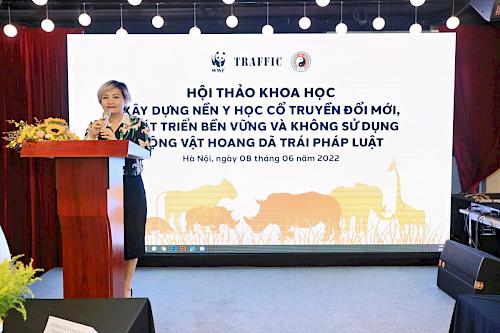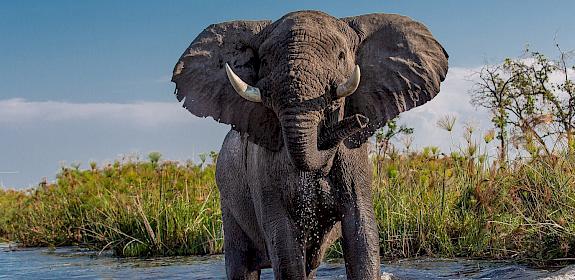Viet Nam’s Traditional Medicine sector commits to reducing the use of illegal wildlife products
Today signals a new chapter for Viet Nam’s Traditional Medicine (TM) sector as TRAFFIC and the Viet Nam Oriental Traditional Medicine Association (VOTMA) are working with TM doctors in the country to reduce illicit products being prescribed.

In Viet Nam, the use of rare species products such as ivory and rhino horn for social display or decoration is often illegal and contributes directly to global wildlife crime. In addition, illegal wildlife products are still prescribed by doctors to promote wellness or treat illness in Traditional Medicine.
Efforts to tackle the illegal wildlife trade must involve searching for sustainable alternatives to illicit wildlife products alongside guidance for TM practitioners.
TM practitioners have a huge influence on what patients choose to buy, so I’m encouraged that through our work with VOTMA, TM practitioners are willing to change their advice. What is critical however is for TM practitioners to switch to safe, legal and sustainable plant-based alternatives with no delay, to stop the adverse effects on species and international crimes.”
Ms Nguyen Tuyet Trinh, TRAFFIC Viet Nam Office Director
Yesterday, TRAFFIC and the VOTMA gathered 60 TM leaders, practitioners, and students in a scientific workshop to promote innovative solutions to eradicate the treatments using endangered wild animals and their derivatives.
The workshop provided participants with knowledge on:
- The impact of the continued use of endangered species on public health
- The conservation of wild species
The event featured a concerted discussion on feasible, comprehensive, and consistent measures that various actors in the TM sector can implement to reduce the use of ingredients from illegal wildlife in TM products and treatments.
PhD. Doctor. Hoang Thi Hoa Ly, Chief of Office, TM Management Department, Ministry of Health said: “The national TM strategy dictates that the use of TM natural ingredients must not threaten the ecosystem and the population of wild fauna and flora. COVID-19 has put the spotlight on the wildlife trade, and we strongly support the efforts aiming to stop the unsustainable demand for wildlife species, particularly for medicinal purposes, as a proactive and preventive means to prevent potential future zoonotic spillover. Disease prevention is also far more effective and less costly than disease control. More than ever, it is time to combat the illegal wildlife trade in connection with the public health sector.”
Workshops participants agreed that the balance with nature is crucial for the TM sector, and using endangered animals for medical purposes is against nature. Choosing a sustainable plant-based alternative can contribute to create a safer and stable healthcare system in the community. In addition, reducing wildlife trade and breaking consumption systems are part of the complete response to prevent future pathogen spread and zoonoses.
I call for TM practitioners and the whole society to adopt scientific, effective, and sustainable health treatment practices. The continued use and prescription of a variety of wild animal parts like rhino horn, tiger products and pangolin scale should be replaced by other available and even more effective TM ingredients. Viet Nam’s TM is part of the country’s healthcare system, but we should take care of both human health and animals. If we continue using endangered species, it will damage the reputation of TM practitioners.”
Doctor Nguyen Van The, Head of Internal Medicine, Traditional Medicine Hospital, Ministry of Public Security
Ms Nguyen Tuyet Trinh continued, “TRAFFIC is committed to helping accelerate this change by equipping the TM sector with required resources and tools to take concrete actions, heading to the non-use of wild species in health treatments”.
Notes:
The workshop is part of the initiative to reduce the use of rhino horn as a medicinal remedy funded by the WWF Germany. Such effort is crucial in contributing to sustaining the population of rhinos and other endangered species and the balance of the whole ecosystem.




